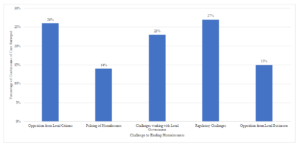Continuums of Care Survey 2020: Results and Recommendations
By Kasia Klasa, Naquia Unwala, Scott L. Greer, Julia A. Wolfson, and Charley E. Willison
Introduction
Millions of Americans experience homelessness every year. The federal government has a governance structure in place to design and implement solutions to homelessness in communities across the country. This system, or these structures, are known as the Continuums of Care (CoCs). The Continuums of Care are most often locally organized groups of actors that receive funding from the federal government to create and carryout solutions to homelessness. Yet, despite this formal system, we know almost nothing about these CoC structures that are responsible for the essential policy task of reducing and ending homelessness in cities across the United States or how they operate and challenges that they experience in their efforts to reduce and end homelessness. Understanding these systems is crucial to creating effective solutions to reduce and end homelessness.
Our research team surveyed (March 2020 to January 20211; Qualtrics XM) Continuums of Care (CoCs) across the United States and its five major territories to better understand: how they are organized; strengths and weaknesses they face in their task to end homelessness in their jurisdictions; and how they responded to and were impacted by the COVID-19 pandemic. We were able to survey over 50% (n=225 responded; n=213completed) of the CoCs in 2020, generating a nationally representative sample stratified across types of CoCs and with 47of 50 states represented. The Continuums of Care survey is the only nationally representative survey of Continuums of Care and their governance structures.
Key Findings
- Most local governments and Continuums of Care (CoCs) don’t work together, or CoCs are not a part of local government. These governance arrangements create challenges when CoCs don’t have the authority necessary to carry out all of their policy tasks and resource constraints where CoCs don’t have access to funding mechanisms they otherwise might. In 2020, only 28% of CoCs were a part of municipal government.
- Our results also demonstrate gaps in service capacity for the CoCs across categories or types of homelessness. There is a clear breakdown in CoCs’ perceived capacity to successfully end homelessness across types of homelessness. Housing Opportunities for Persons with AIDS (HOPWA) and veteran homelessness has the highest capacity, with CoCs reporting the most success to ending these categories of homelessness. CoCs rank their ability to successfully end chronic homelessness, family homelessness, and unaccompanied youth homelessness much lower, with substantial variation across CoCs in their perceived capacity to end these categories of homelessness. Additionally, there is very little political and financial support for single adult homelessness, particularly among those who are chronically homeless and young adult men.
- Despite these challenges, our results identify that meaningful coordination with government improves service delivery and would improve systems competencies in CoCs going forward. CoCs indicated the need for increased coordination or formal integration with government structures depending on their jurisdiction (state or local), in order to improve access to resources to have the authority or ability to finance, design and implement policy solutions to end different types of homelessness. About half of CoCs surveyed indicated increased coordination with government or new resources in ways they had never experienced as a result of the increased salience of homelessness during the COVID-19 pandemic. CoCs reported that this increased coordination was enhancing resources and authority available to support homeless solutions (e.g. rapid housing provided through local hotels, trailers, etc. and efforts to make these permanent).
- In the face of this progress, there is still substantial room for improvement. While many CoCs discussed increased coordination with government during the pandemic, nearly 100% of CoCs listed limited participation by many relevant stakeholders in their jurisdiction – including local and state government, police/law enforcement, and healthcare organizations. The greatest challenges CoCs list in their mission to prevent/end homelessness are capacity issues related to limited funding, housing supply and staffing, challenges working with local government (including regulatory challenges, and policing of homelessness), and opposition from citizens and businesses in their community.

Greatest Challenges to Preventing/Ending Homelessness
Policy Recommendations
- Increase coordination and support by relevant government jurisdictions for CoC activities – whether that is participating in the CoC stakeholder body; coordinating with the CoC in decision-making and implementation; integrating CoC knowledge and expertise into local policy decisions affecting policies related to homelessness; or funding CoC efforts and activities. Our results demonstrate that increased coordination with government in CoC jurisdictions is critical to providing the CoCs with the authority and capacity necessary to carry out solutions to homelessness.
- Target governance innovations and capacity improvements on chronic, child and family, and unaccompanied youth categories of homelessness. Nationally, Continuums of Care report the most success in their ability to prevent and end homelessness among veterans and persons living with HIV/AIDS. The other three categories are ranked substantially lower by CoCs, indicating a need to focus policy solutions and investments by governments and stakeholders to support CoC efforts on these categories of homelessness.
- As the Biden Administration rolls out “House America,” improving relationships with governmental authorities will be essential to successfully implementing homeless policy strategies including: deliver pass-through funding to CoCs, approve development for new permanent and temporary housing, and reduce the criminalization of homelessness that interferes with coordinating pathways to housing. Our results illustrated similar challenges related to the CARES Act rollout during the start of the COVID-19 pandemic. We anticipate similar challenges will arise during “House America” implementation.
